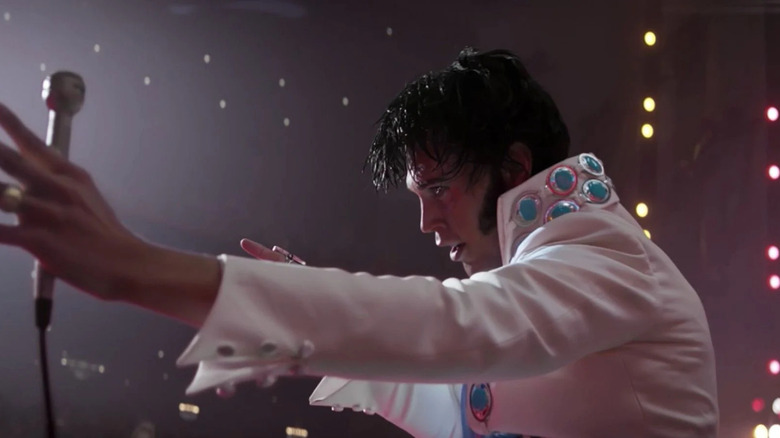Elvis Review: An Electric, Excessive Musical Biopic That Feels Like A Comic Book Movie [Cannes]
It is fitting that maximalist filmmaker Baz Luhrman is making his return to theaters after almost a decade with a movie about one of the most maximalist performers in American history. "Elvis" recounts the rise and fall of the King of Rock and Roll not as just another biopic that "Walk Hard" already perfectly parodied, but as a comic book movie told from the perspective of the supervillain of Elvis' story: his long-time manager Colonel Tom Parker.
The Salieri to Elvis' Mozart, or more aptly for this movie, the Doctor Sivana to Elvis' Captain Marvel, the Colonel serves as the film's unreliable narrator, in the film's first of many pivots from the standard music biopic. Rather than Elvis having to think about his entire life before playing on stage, the movie starts with a dying Colonel telling the story of his relationship with Elvis and the many "misconceptions" about their work and life.
This is a rather odd choice, not because the idea of an Elvis movie framed from the villain of the story is an inherently bad idea, but because the film can't fully decide if Parker is truly a villain or not. Even outside the narration, "Elvis" seemingly wants to picture Parker as a lovable uncle who genuinely wants what is best for you — even if he's still slowly stabbing you in the back. Casting America's dad, Tom Hanks, as Parker doesn't help.
Tom Hanks unhinged
This is mostly because Hanks is wearing so many prosthetics and uses a ludicrous and over-the-top Bond villain accent that it makes Colin Farrell's Penguin look like a nuanced performance. When he first hears Elvis on the radio, Parker laments that no white audience will accept his carnival act if it has a Black performer, then the camera pulls a dramatic Spielberg-like zoom on Kodi Smit-McPhee's face as he says that Elvis is white actually. Parker's response, "He's white?!" packs as much, if not more, over-the-top dedication as when Hanks said goodbye to a volleyball in "Cast Away."
There's even a little "Nightmare Alley" in the Colonel's relationship with Elvis, with the not-so-subtle placement of a giant "GEEK" sign behind Elvis at a carnival teasing the fate of the performer. Indeed, What makes "Elvis" different than many musical biopics is that there is no promise of a comeback after the inevitable fall of the star, no return to the stage after rehab. Instead, like "Amadeus," there is a sense of doom and tragedy throughout the film, with Luhrmann teasing what Elvis could have been if it wasn't for the Colonel: an international star, a political activist, the star of "A Star is Born."
But framing the movie from Parker's perspective, and constantly cutting to him makes "Elvis" constantly lose its momentum. At its worst, "Elvis" is a poorly paced, overly long movie that should have either been shorter or turned into a miniseries. Likewise, Luhrmann's trademark blend of old and new songs backfires. It's understandable that he would want to make audiences who, according to him, "only know Elvis from 'Lilo & Stitch'" understand Elvis' impact at the time by adding modern remixes of his songs by Doja Cat and others, while also adding Backstreet Boys to the soundtrack, but they end up feeling like distractions.
Butler the superstar
And yet, it's hard not to swoon from the electrifying musical scenes like one of the teenage girls at an Elvis concert. This is in no small part due to Austin Butler's outstanding and career-defining performance as the king himself. Even if his looks don't always match perfectly, Butler easily captures the essence of Elvis in a way that brings to mind Diego Boneta's performance in the excellent and underseen "Luis Miguel: The Series." Butler completely nails the mannerisms, the boyish charm and smoky eyes that captivated a nation, the mesmerizing hip movements and swirling pelvis that introduced sexuality to American TV through his musical performances.
Like Taron Egerton in "Rocketman," Butler shows himself adept at channeling the sound of the king — he sings the vast majority of the songs from the '50s period, but as the film goes on and Elvis' voice changes drastically, Elvis' real voice is used more and more. Sadly, fans of fat Elvis may be disappointed, with the film speeding past his final days in favor of, you guessed it, more Colonel Parker.
Luhrmann shows himself to be the perfect choice to make a comic book-y take on Elvis, making it maximalist and over-the-top in every conceivable way, from the excessive runtime, lavish production design, and wacky camerawork that is as obsessed with Elvis' wiggling crotch as his crazed out fans. But the best decision Luhrmann makes is to use the film's editing to reflect Elvis' love of comic books. The film pulls a page out of Ang Lee's severely underrated "Hulk," and often splits the screen into panels, which together with the lightning-fast edits help give the film, especially its musical numbers, feel like a bolt of electricity running through your body.
A wonderful time at the movies
Though "Elvis" is not a super insightful look into the life of the king for hardcore fans, it does try to shine a different light on his life than what modern pop culture has focused on. Luhrmann is quite interested in Elvis' relationship with Black music and culture, and his love and respect for it. This is a movie ardently against the idea that Elvis just stole from Black music, showing him openly praising Black musicians, who in turn inspired by him.
He is most at home listening to and singing gospel music, spending his time on Memphis' Beale Street, the home of Blues, and hanging out B.B. King (Kelvin Harrison Jr.) while listening to Little Richard (an excellent Alton Mason) and Big Mama Thornton (Shonka Dukureh). Just like Elvis challenged the idea of sexuality in '50s America, he played a role, however small, in integration through pop culture, with a fan base that crosses racial boundaries.
That being said, the film goes a tad too far with this idea, almost making Elvis a would-be political activist. His hurt over the state of the world comes out of nowhere and is quickly left behind, only serving to further pad out the runtime.
"Elvis" is the Baz Luhrmanniest film Baz Luhrmann has made yet, a compilation of his greatest filmmaking hits, all employed for a film as excessive and grandiose as Elvis himself. Though the framing device doesn't always work, Austin Butler's stunning performance, lavish production design, and comic book-like editing make for a movie not unlike one of Elvis' own — full of personality, kind of empty, but undeniably enjoyable.
/Film rating: 7 out of 10
"Elvis" premiered as part of the Cannes Film Festival 2022.



